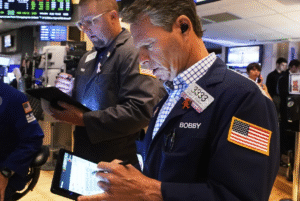Global stock markets showed mixed results on Friday following the latest escalation in the China-U.S. trade war. While Japan and some European markets experienced losses, others remained steady.
The S&P 500 futures rose by 0.7%, and the Dow Jones Industrial Average futures increased by 0.4%. Japan’s Nikkei 225 index initially dropped more than 5% but later recovered slightly, closing 3% lower at 33,585.58.
Tensions escalated after China announced it would raise tariffs on U.S. exports to 125%, aligning them with U.S. tariffs, excluding a 20% hike imposed earlier. A Chinese Finance Ministry spokesperson criticized the U.S. tariff strategy, calling it a “numbers game” with no practical economic value and vowed to retaliate if the U.S. continues its actions.
As the trade war deepened, the bond market showed signs of distress. The yield on the 10-year Treasury note was at 4.40% early on Friday, a significant rise caused by a sell-off in bonds. Treasury yields increased sharply earlier this week, hitting nearly 4.50%, before falling back to 4.30% after a positive inflation report was released.
In early European trading, Germany’s DAX fell by 1% to 20,353.16, and France’s CAC 40 dropped by 0.4% to 7,100.90. The UK’s FTSE 100, however, gained 0.5% after data showed the British economy grew by 0.5% in February, exceeding expectations.
Asian markets showed resilience, with China’s stock exchanges seeing positive movement after President Xi Jinping’s diplomatic engagements. Hong Kong’s Hang Seng Index rose 1.1% to 20,914.69, while Shanghai’s Composite Index climbed 0.5% to 3,238.23. Taiwan’s Taiex also surged by 2.8%, driven by expectations of increased orders for Taiwanese technology products as U.S.-China trade relations cool.
On Thursday, U.S. stocks suffered significant losses, with the S&P 500 dropping 3.5% and the Nasdaq falling 4.3%, reversing much of the previous day’s gains following Trump’s decision to delay tariffs for many countries. The Dow Jones Industrial Average also lost 2.5%. Market analysts view Trump’s tariff delay as a temporary strategy, not a permanent shift in policy, which led to skepticism about the sustainability of the market rally.
Further clarity on the tariffs revealed that the U.S. would impose a 145% tax on Chinese imports, higher than initially expected, which contributed to a steep drop in stock prices.
In commodity markets, U.S. crude oil gained 47 cents to $60.54 per barrel, while Brent crude rose by 40 cents to $64.73 per barrel.
The currency markets saw the dollar weaken against the yen, with one dollar buying 142.58 yen, down from 145 yen the previous day. The euro strengthened against the dollar, rising to $1.1380 from $1.1200.
This summary reflects the economic tensions and market reactions amid the intensifying trade war between the U.S. and China.














